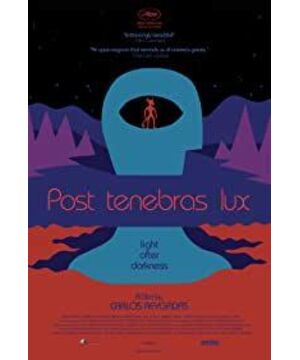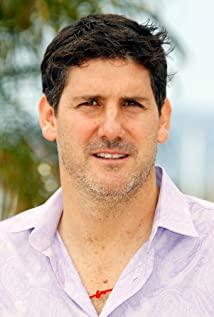Later, there was a director who was infected by Ta's footage and therefore devoted himself to the film career - Carlos Reygadas.
For "Post Tenebras Lux", I think Bergman's evaluation can be reversed: that is, there is no other art theme that is more suitable than film to show the realm that the artist has wanted to express for a long time but didn't know how to express it!
Some people compare this film with "Zerkalo". This comparison is not necessarily far-fetched. I think that "Mirror" is a philosophical speculation from the perspective of human destiny and the spirit of the times. Tenebras Lux" is a perceptual search from the perspective of the subconscious and dream, and its poetry falls on the microscopic level. From this point of view, "Mirror" is epoch-making, while "Post Tenebras Lux" is more realistic.
Some people think that the symbolism used in this film, I don't fully agree with that. Just as Tashi also opposed pure symbolic symbolism in the selection of film materials, simply put, as Tashi emphasized, artistic expression with the simple purpose of showing truth has won a strong resonance among moviegoers. It is not purely symbolic, that is, the audience has personally understood the meaning that the director wants to express, so as to achieve a sense of participation in the time line of the film, rather than reading a textbook to penetrate the language of the film through examples such as symbolism. Therefore, I also object to the notion that this film is experimental, because Post Tenebras Lux is by no means transcendental, on the contrary, empirical!
The personalization of the film leads to a controversial interpretation of the film after all, but it is still a useful attempt.
The sequence from the beginning of the film to the end of the glowing red monster is the sequence of the film. The connection between the scene where Juan's daughter Eleazar is lost in the grass and the part where the red-light monster sneaks into the house can be described as magical. The reason why I say this is that the opening chapter is full of prelude. The football field, horses, dogs, everything is so familiar and strange, followed by heavy rain, night, lightning, and thunder. The girl is alone, bringing the audience into the light and the light. In a deep dream intertwined with darkness. This scene reminds me of a bad commercial movie - the plot in Luc Besson's "Lucy", Lucy, when the brain cells develop to a certain extent, realizes that when he is a baby, in the mother's body It's incredibly rich and indescribable, and likewise, the opening scene seems to try to create a similarly mysterious feeling that no one can remember. After the long shot, it suddenly cuts to the warm and comfortable residence, and the glowing red monster quietly enters, which forms a natural transition process between the two dreams. In other words, the dream has not yet woken up, but the scene has changed, and the atmosphere has changed from extremely dangerous. Switch to great security. It is not difficult to find that the monster's behavior is very clumsy, even a little comical, like an alien visitor, he is carrying a box, as if to carry out a task that makes him overwhelmed. Then a waking child appeared, staring at the monster in confusion. Undoubtedly, this picture is confusing, but it is not abrupt, but more conveys a kind of helplessness and helplessness, it is about a transitional helplessness and helplessness, that is, transitioning into the adult world, entering real life, Start a game with an unpredictable, absurd process, and a tragic ending. Echoing this, at the end, the same scene is arranged before Seven walks into the forest. If the intention expressed in the opening paragraph of the red monster is still relatively obscure, the repetition at the end is blatantly harsh, followed by the collapse of the forest, full of strong sensibility and pessimism, this is a hopeless prophecy, marking the The collapse of the dream, the silence of a cold, terrifying, deep-seated death.
Then directly to the ending of the movie, evocative and amazing design! So that the overall logic of those pieces of material is linked together. This design is intentional but subtle, and my understanding is that football is the reality! Speaking of which, there is no need to argue which part of the film is a dream and which part is reality, such as the scene of Juan and Nathalia in the sex club, which is more of Juan's subconscious (the two are suddenly able to speak fluently). French is already showing signs). But it's worth noting that in the first third of the film, after Juan's visit to the mutual aid club, there is a sudden transition to the pre-teen rugby scene. In that group of shots, there is stress, anxiety, danger and unpredictability. (Again, it's a perfect camera cut, a contrasting party scene with mutual greetings, fireworks, and warm singing) Based on the director's personal experience, he's probably a player on one of the teams , If at that time, the boy didn't know the fate of life, just like he didn't know the outcome of the ball game, just like the viewer didn't know the story that happened between Juan and Seven later, and later, fate led everything to a tragic The ending; with it, the dream also escapes into desolation and nothingness, and after the final despair bursts into a red blood, time snaps back to the moment of the football game. For the boys on the field, the ball game full of fierce confrontation may be his first fight against fear and the unknown, but the ball game is temporary after all, and everything has not yet come, just as the title of the film "Post Tenebras Lux" , which is Latin for "Light after darkness", the sun is obscured by the haze above the sky. After the game, everything that will happen in the future will happen one after another. Can we make a new choice of destiny, and even if we make a new choice, will we still face difficulties and be in embarrassment? It is like the argument between the two old people in the film when they play chess: "We can play another game."; "Or are you tired?" Juan was finally tired, and he didn't want to start the game again, because he knew that it would probably end like this again. The director threw an open-ended question at the end: "Since life has been examined, there is no shortage of letting us start over, and how should we act?". It is still a frequently switched and trembling shot, unknown, restless, tense and a sense of fear hidden in the blood vessels and the pressure of being forced to overcome this fear.
In the party section of the film, Juan quoted a passage from Pierre in "War and Peace" at the dinner, which made the surrounding guests feel puzzled. The background is the latter part of the novel, the story after the outbreak of the Russo-French War in 1812. Juan's attitude carries a kind of contempt and ridicule. In the film, he is a white man living in Mexico, a member of high society, but different from others, he recognizes the fragility of human nature, the lack of spirit and The distortion of values, at the same time, his own life is equally sad, unable to restrain his desires, becoming increasingly dejected in the warm but monotonous joy of family, without direction, and lost. It is worth savoring that Pierre finally obtained peace, and the peace that Toon gave Pierre was not only the peace of mankind, but also the peace of humanity. And Juan's final ending is tragic. Before he died, he experienced an abnormal peace and a warm feeling of returning to being a baby. This passage is the most soothing and strongly individualistic. Juan's monologue is very poetic, but it feels more depressing. The most moving thing is Juan's poetic self-talk. He also said, Now it's Rut's and Eleazar's turn. The father is like a salmon migrating across the nostalgic sea, and the children start in the opposite direction of irreversible reincarnation. Before leaving, Juan felt relieved and full of sympathy. He wanted the dog to accompany him. It was not that he could not remember who the murderer was, but that he no longer wanted to investigate everything, and he no longer wanted to explore the meaning of life. shimmer.
The mirror used in the film is unique. The spherical effect created by the glass bottle makes the edge blurred, as if the outside of the circle is outside the realm of dreams, but the eyeballs of the viewers are trapped in the bottle and cannot escape from the dream at all. There is a scene in the film where the waves are shot. It really looks like Terrence Malick here. The camera is very low and creates a wide-angle feeling (Malick is particularly fond of this "cool bystander's eye" approach, The camera is neither the eye of God nor the eye of a third party, sometimes the eye of inanimate objects, such as the eye of rocks, grass, and sometimes the eye of non-stationary moving objects, such as the eye of flying insects, floating dusty eyes, etc.), the sound of the waves washes out the bar noise in the previous scene (again, a perfect cut), and then night falls, again with the child at the center of the picture, corresponding to the opening scene, quite There is a smell of the birth of human beings (also referred to as the spiritual realm, the origin of philosophy) in the chaos, and this hope is also just in line with the topic. This succession paragraph strengthens the speculation. It is obvious that the director is exploring the question of "where to come from and where to go", beating dogs, shooting birds, chopping trees, etc., all emphasize the status of human beings as rulers, and horses appear frequently in the film and the dog, all shot from the vantage point of the conqueror, and at this moment, the raging waves wash the shore, the sea of clouds wraps the afterglow of the setting sun, and the force majeure of nature breeds and evolves in the process, which reflects the insignificance and frailty of human beings.
Regarding the narrative of this film, I think that the jumping dream transition and the structure of a large number of episodes have not weakened the logic and tension of the narrative too much. Take Seven's ending as an example, has he really seen his wife and children again? I don't think so, it's just a dream of Seven himself. Juan and Seven, two types of people, belong to two different classes, parallel to the intersection, starting with the main line and ending with the auxiliary line, which is clear and clear.
Finally, I would like to revisit the ending sequence of the film, this time without Schopenhauer. In the first chapter of Genesis, it is written: God said there should be light, and there was light in the world. Philosophers may have other views on the perception of the emergence of light. Let’s first look at “the world is my appearance”, life is a big dream, isn’t that the core of the film’s format! Then look at “the world is my will”, “Das Leben schwingt, gleich einem Pendel, hin und her zwischen dem Schmerz und der Langeweile." That's not what Juan and Seven are, the people who confess themselves in the mutual aid clubs, the fat guy who keeps yelling at the fat guy who wants to cut down trees, the skinny guy who talks to Nathalia in the bar, the guy in the sex club Men and women, not even the neighbors at the dinner table, there is no one whose life is not like this! At this point, the weight at the end of the film is already full of fruit - this is not a match between two teams, this is clearly a contest between human beings and self, a contest between reason and will. Before the score (just like the game in the film is not divided), the light has not yet come!
View more about Post Tenebras Lux reviews









